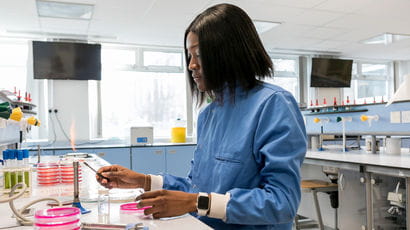Bats and tunnels: an experimental approach to identify effective lighting strategies for tunnels occupied by bats
Introduction
An opportunity to apply for a funded full-time PhD in the Bat Conservation Research Lab at Faculty of Health and Applied Sciences, UWE Bristol. The studentship will be funded by UWE Bristol and TRT Lighting and Greenways Cycle Routes.
The expected start date of this studentship is 1 January 2023.
The closing date for applications is 4 October 2022.
Studentship details
Across the UK many disused railway tunnels are being redeveloped for use as cycle and footpaths. Such developments require substantial works to tunnels to facilitate human use and comply with safety standards. Works include resurfacing, roost and wall stabilization and lighting the inside and entrance of tunnels with artificial light. Disused tunnels make good habitat for bats which use them for roosting, commuting, foraging and swarming.
As all UK bats are protected species, their presence in tunnels means any development requires a derogation license from Natural England and a method statement to outline predicted impacts and appropriate mitigation strategies. Ecological studies have demonstrated that bats (Chiroptera) are sensitive to AL, and are impacted according to their specific habitat preferences and associated echolocation and morphological adaptations (for example, Stone, et al. 2015, Rowse, Lewanzik, Stone, et al. 2016). Despite increased understanding of the impact of lighting on bats, there is a lack of understanding of how and why bats use tunnels, and the relative importance of tunnels to bat conservation. In addition, the impact of lighting on bats using tunnels has not been tested and there is no guidance on effective tunnel lighting strategies to minimise impacts on bats.
Working closely with industry this studentship will test and identify effective lighting strategies for tunnels occupied by bats to facilitate co-use of tunnels by bats and communities. We will use findings to develop industry specific guidance on illumination of tunnels occupied by bats and inform industry practice.
The project is supervised by Dr Emma Stone as part of a larger programme on bats and lighting. The PhD is co-funded by the University of the West of England, North Somerset Council, TRT Lighting Ltd and Greenways Cycle Routes. Data collection will involve night work surveying bats, conducting lighting experiments at tunnels surveys as well as time working away from the university unsupervised. We are looking for candidates who are reliable, resourceful and have a positive attitude to the challenges of field work. Experience of ecological niche modelling, bat acoustic analysis and GIS is highly desirable. The ability to communicate effectively with a wide variety of stakeholders, including industry, landowners, bat groups, ecologists, planners, the public, and research scientists is essential.
Candidates must be able to drive and will begin data collection from April 2023.
For an informal discussion about the studentship, please email Dr Emma Stone at emma4.stone@uwe.ac.uk.
Funding
The studentship is available from 1 Jan 2023 for a period of three years, subject to satisfactory progress and includes a tax exempt stipend, which is currently £16,062 per annum.
In addition, full-time tuition fees will be covered for up to three years (Home/EU rates only).
Please note: Overseas applicants will be required to cover the difference between Home/EU and the overseas tuition fee rates in each year of study.
Eligibility
The following criteria will be taken into account when considering applications:
- The strength of your professional and academic profile, as demonstrated through previous study and/or professional experience.
- The quality, invention and viability of ideas relating to the research project you are applying for.
- The contribution you are able to make to the Hartpury and UWE Bristol research communities and universities, in terms of both research and teaching.
Candidates should also be aware of the following:
- The normal expectation is that applicants will hold at least a 2:1 or a Masters qualification from a UK university or a degree of comparable standing from a university outside the UK. The candidate’s degree relevant to the studentship should demonstrate their potential for practice-led research or alternative evidence of research aptitude.
- Applicants whose first language is not English require a recognised English language qualification. The minimum entry requirement is GCSE English at grade C or above or IELTS.
How to apply
Please submit your application online.
When prompted use the reference number 2223-JAN-HAS01.
Supporting documentation: you will need to upload your research proposal, all degree certificates and transcripts and proof of English language proficiency as attachments to your application, so please have these available when you complete the application form.
Closing date
The closing date for applications is 4 October 2022.
Further information
Interviews will take place in October 2022. If you have not heard from us by the beginning of November 2022, we thank you for your application but on this occasion you have not been successful.
You may also be interested in

Contact the Doctoral Academy
Ways to contact the Doctoral Academy, from postgraduate research support to submitting your thesis.

Fees and funding
View Doctoral Academy tuition fees, project fees, completion fees and resubmission fees.

About the Doctoral Academy
Find out more about the UWE Bristol Doctoral Academy.

Research
Discover how research at UWE Bristol is making a real impact.
